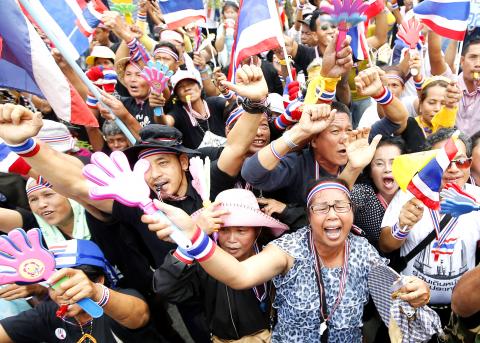Thai opposition protesters besieged several more ministries in Bangkok yesterday to try to topple the government, as Thai Prime Minister Yingluck Shinawatra faced a no-confidence motion in parliament and warned against “mob rule.”
Tens of thousands of demonstrators have rallied against Yingluck and her brother, ousted Thai prime minister Thaksin Shinawatra, in the biggest street protests since 2010, when more than 90 people were killed in a military crackdown.
Demonstrators surrounded the interior, agriculture, transport, and sports and tourism ministries, ordering officials inside to leave, a day after occupying the finance and foreign ministries.

Photo: EPA
The turmoil has caused international concern and raised fears of fresh street violence in a country that has been rocked by several episodes of political unrest since royalist generals overthrew Thaksin in a 2006 coup.
The billionaire telecom tycoon-turned-politician draws strong support from many of the country’s rural and urban working class, but he is loathed among the elite and the middle classes, who accuse him of being corrupt and a threat to the monarchy.
Several thousand protesters, waving Thai flags and blowing whistles, marched to the interior ministry, which was guarded by hundreds of security personnel, according to a reporter at the scene.
Apart from the Thai Ministry of the Interior, most government buildings taken over had only a light security presence outside.
However, security has been tightened on Bangkok’s streets since the expansion late on Monday of the Internal Security Act, which gives authorities additional powers to block routes, impose a curfew, ban gatherings and carry out searches.
A Thai court yesterday approved an arrest warrant for protest leader Suthep Thaugsuban — who resigned from the opposition Democrat Party to head the rallies — in connection with the occupation of government buildings.
“I ask him to surrender, otherwise police can arrest him on sight,” said Colonel Sunthorn Kongklam of Bang Sue police station in the capital.
Yingluck yesterday reiterated that authorities would “absolutely not use violence” as she arrived at parliament, which was guarded by dozens of police.
The ruling Puea Thai party, which holds a comfortable majority, is expected to win the censure vote expected later in the week.
Adding to tensions in the capital, an unexploded hand grenade was yesterday discovered outside a Democrat Party office in Bangkok, police said.

MORE VISITORS: The Tourism Administration said that it is seeing positive prospects in its efforts to expand the tourism market in North America and Europe Taiwan has been ranked as the cheapest place in the world to travel to this year, based on a list recommended by NerdWallet. The San Francisco-based personal finance company said that Taiwan topped the list of 16 nations it chose for budget travelers because US tourists do not need visas and travelers can easily have a good meal for less than US$10. A bus ride in Taipei costs just under US$0.50, while subway rides start at US$0.60, the firm said, adding that public transportation in Taiwan is easy to navigate. The firm also called Taiwan a “food lover’s paradise,” citing inexpensive breakfast stalls

TRADE: A mandatory declaration of origin for manufactured goods bound for the US is to take effect on May 7 to block China from exploiting Taiwan’s trade channels All products manufactured in Taiwan and exported to the US must include a signed declaration of origin starting on May 7, the Bureau of Foreign Trade announced yesterday. US President Donald Trump on April 2 imposed a 32 percent tariff on imports from Taiwan, but one week later announced a 90-day pause on its implementation. However, a universal 10 percent tariff was immediately applied to most imports from around the world. On April 12, the Trump administration further exempted computers, smartphones and semiconductors from the new tariffs. In response, President William Lai’s (賴清德) administration has introduced a series of countermeasures to support affected

CROSS-STRAIT: The vast majority of Taiwanese support maintaining the ‘status quo,’ while concern is rising about Beijing’s influence operations More than eight out of 10 Taiwanese reject Beijing’s “one country, two systems” framework for cross-strait relations, according to a survey released by the Mainland Affairs Council (MAC) on Thursday. The MAC’s latest quarterly survey found that 84.4 percent of respondents opposed Beijing’s “one country, two systems” formula for handling cross-strait relations — a figure consistent with past polling. Over the past three years, opposition to the framework has remained high, ranging from a low of 83.6 percent in April 2023 to a peak of 89.6 percent in April last year. In the most recent poll, 82.5 percent also rejected China’s

PLUGGING HOLES: The amendments would bring the legislation in line with systems found in other countries such as Japan and the US, Legislator Chen Kuan-ting said Democratic Progressive Party (DPP) Legislator Chen Kuan-ting (陳冠廷) has proposed amending national security legislation amid a spate of espionage cases. Potential gaps in security vetting procedures for personnel with access to sensitive information prompted him to propose the amendments, which would introduce changes to Article 14 of the Classified National Security Information Protection Act (國家機密保護法), Chen said yesterday. The proposal, which aims to enhance interagency vetting procedures and reduce the risk of classified information leaks, would establish a comprehensive security clearance system in Taiwan, he said. The amendment would require character and loyalty checks for civil servants and intelligence personnel prior to